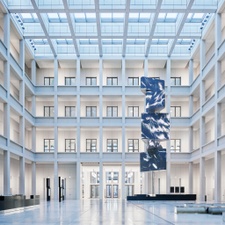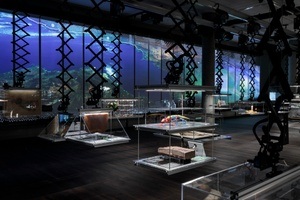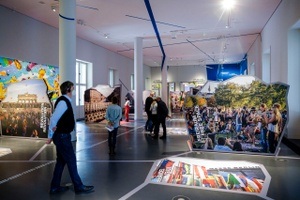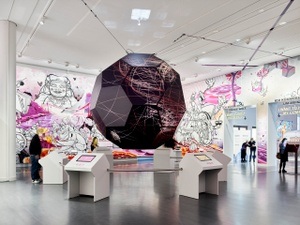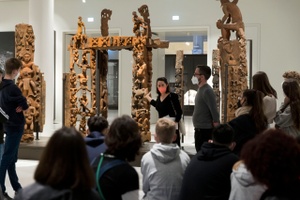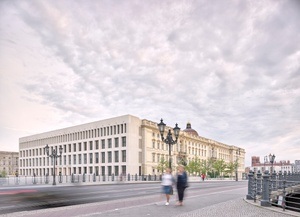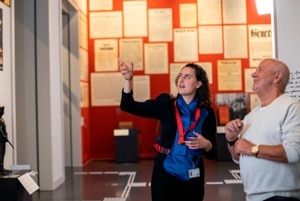Einblick in die Welt der Kartographie. WELTSTUDIO spezial: Landkarten befragen – Karten selber gestalten
In the organizer's words:
In five exciting short lectures, scientists and curators at BERLIN GLOBAL will provide insights into the world of cartography.
Program
Critical Cartography with Camila Narbaitz Sarsur and Dr. Anne Kurr
11:30-11:45 am: Lecture in German language
14:00-14:15: Lecture in English language
Maps are ubiquitous in our lives, from the GPS on our phones to the atlases in our classrooms. Yet few question their nature or their creation process.
This short lecture will delve into the realm of critical cartography and examine how maps have historically been instruments of power and influence.
We will challenge the notion of maps as static, objective documents. Instead, we will look at them as dynamic, evolving entities shaped by subjective perspectives. Drawing on Michel Foucault's concept of 'discourse', we will explore how maps not only represent spatial information, but also organize geographical knowledge and structure our collective understanding of situations. We will examine how maps as discourses about the world can make problems visible or invisible, influence the way problems are addressed, and derive political power from them.
Coastal profiles and navigation: from historical maps to modern voyages with Karen Meirik, Maritiem Museum Rotterdam
12:00-12:15: Lecture in English language
14:30-14:45: Lecture in English
Karen Meirik presents the historical museum collections of the Maritiem Museum Rotterdam. She will also look at the way in which sailors mapped the Strait of Magellan, from the 16th century to the voyage of the HMS Beagle - the ship on which Charles Darwin found the inspiration for his theory of evolution. It illustrates how important coastal profiles were at a time when it was not yet possible to determine longitude at sea.
Maps and landscape profiles with Alexander von Humboldt with Manfred Gräfe, Stadtmuseum Berlin
12:30-12:45: Lecture in German language
15:00-15:15: Lecture in German language
The Stadtmuseum Berlin preserves in several collection areas partly unique testimonies about the eventful life and universal work of Alexander von Humboldt.
Among these, the Humboldt Collection Hein, comprising around 2,000 objects and compiled by Prof. Dr. Wolfgang-Hagen Hein over several decades, forms the largest closed collection, which also includes several maps and landscape profiles. These include - as a highlight of Alexander von Humboldt's work - the large-format colored plate "Geography of plants in the tropical countries - a nature painting of the Andes". It was included in the volume "Ideas for a Geography of Plants", Humboldt's American travel work, published in 1807.
Participants
Camila Narbaitz Sarsur is a critical cartographer and spatial data analyst. In practice, she explores how maps and open data can serve grassroots movements. Her work aims to make geospatial information accessible and understandable to the public.
Dr. Anne Kurr is an art historian and historian and has been working as a cultural mediator for several years. Her focus is on educational programs critical of colonialism, particularly those that question Eurocentric perspectives in representations and maps. She also works as a project coordinator and lecturer at the University of the Arts (UdK) and focuses on topics such as urban interventions and artistic activism.
Karen Meirik is the program director of the Maritiem Museum Rotterdam.
Manfred Gräfe has worked as a zoological taxidermist and collection manager at the Stiftung Stadtmuseum Berlin since 1995. He is responsible for the Zoological Collection and the Humboldt Collection Hein.Manfred Gräfe has worked as a zoological taxidermist and collection manager at the Stiftung Stadtmuseum Berlin since 1995. He is responsible for the Zoological Collection and the Hein Humboldt Collection.
- free of charge plus admission to the exhibition
- Simply drop by the WELTSTUDIO during your visit to the BERLIN GLOBAL exhibition!
- The drop-in is included in the exhibition admission.
- Languages: German, English
- Location: Berlin exhibition, 1st floor, room 5 Berlin Raum
- Belongs to: Consult maps - design maps yourself, BERLIN GLOBAL
This content has been machine translated.



